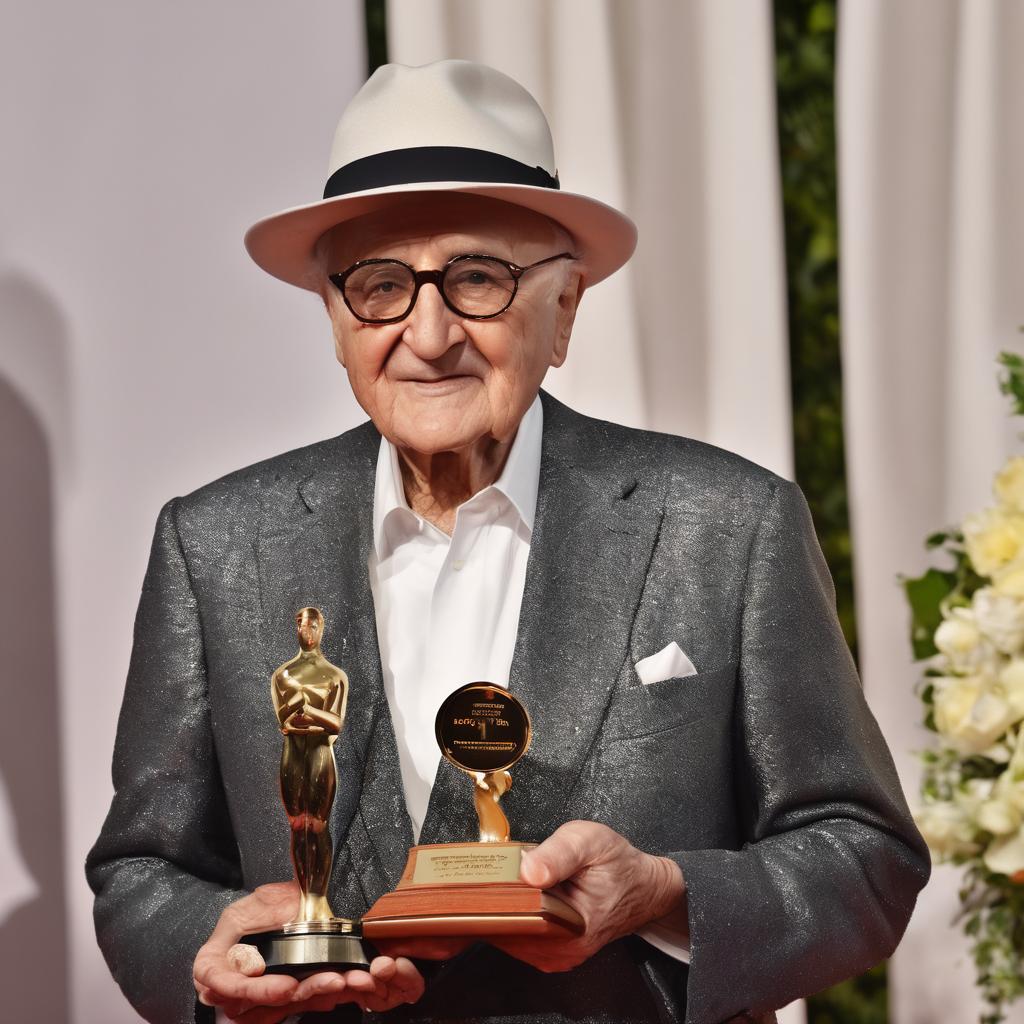
Norman Lear, a writer, producer, and developer who transformed American humor in the early 1970s with innovative, hugely successful sitcoms like “All in the Family” and “Sanford and Son,” passed away on Tuesday. His age was 101.
How old is norman lear: Norman lear age
Norman Lear was born on July 27, 1922. As of the current year, which is 2023, he would be around 101 years old.
https://trendingupdate.in/
Variety was informed by Norman Lear Lear’s representative that he passed away naturally at home in Los Angeles. In the upcoming days, a private service for the close family will be held.
Norman Lear family released a statement saying, “We are grateful for the heartfelt expression of love and support in memory of our wonderful husband, father, and grandfather.” “Norman had a creative, resilient, and empathic existence. He had a great passion for our nation and dedicated his life to upholding its core values of equality and fairness for everyone. The best present of all has been getting to know and love him. We are celebrating this amazing human being and grieving individually. We kindly ask for your understanding.
When Norman Lear came up with the concept for a new sitcom based on a well-liked British program about a conservative, outspokenly bigoted working-class man and his fractious Queens family, he had already made a name for himself as a leading comedy writer and had even earned an Oscar nomination for his screenplay for “Divorce American Style.” “All in the Family” shot to popularity right away, appearing to appeal to audiences of all political stripes.
By adding sharp twists to the traditional domestic comedy formula, Lear’s shows were the first to tackle the major political, cultural, and social hotspots of the day, such as racism, abortion, homosexuality, and the Vietnam War. No topic was off-limits: the attempted rape of lead character Archie Bunker’s wife Edith was the focus of two 1977 episodes of “All in the Family.”
They became enormous ratings triumphs thanks to their newfound outrageousness: “Family” and “Sanford,” which center on a Black family in Los Angeles, were briefly ranked first and second in the nation. Six spin-offs were produced from “All in the Family” alone. In addition, “Family” won four Emmys in 1971–1973 and Lear won a 1977 Peabody Award for “giving us comedy with a social conscience.” In 2016, he was awarded a second Peabody for his contributions in the industry.
Norman lear tv shows :
Norman Lear is renowned for creating several groundbreaking television shows that revolutionized the industry. Some of his most notable TV shows include:
-
“All in the Family” (1971-1979): A groundbreaking sitcom that tackled social issues, focusing on the Bunker family, addressing topics like racism, sexism, and societal changes in America.
-
“Maude” (1972-1978): A spin-off from “All in the Family,” this show centered around Maude Findlay, a strong-willed, outspoken woman, exploring feminist themes and social issues.
-
“Good Times” (1974-1979): Following a working-class African American family living in a Chicago housing project, the show addressed themes of poverty, race, and family dynamics.
-
“The Jeffersons” (1975-1985): A spin-off from “All in the Family,” it portrayed an affluent African American family navigating success and societal challenges after moving to a luxurious Manhattan apartment.
-
“One Day at a Time” (1975-1984): Revolving around a single mother raising her two daughters, the show addressed issues like feminism, divorce, and adolescence.
Normal lear childrenNorman Lear has six children from his three marriages:
-
Ellen Lear: His daughter with Charlotte Rosen, Ellen has been involved in various philanthropic endeavors and is known for her advocacy work.
-
Kate Lear: Also from his marriage to Charlotte Rosen, Kate is known for her work in documentary filmmaking and as a mental health advocate.
-
Maggie Lear: From Lear’s marriage to Frances Loeb, Maggie has been involved in activism and is known for her advocacy work in education.
-
Benjamin Lear: Another child from his marriage to Frances Loeb, Benjamin is a filmmaker and activist focusing on social issues.
-
Brianna Lear: Norman Lear’s daughter with Lyn Davis, Brianna keeps a lower public profile, and not much information is available about her.
-
Madeline Lear: Madeline is Norman Lear’s youngest child with Lyn Davis. Similarly to Brianna, she maintains a private life away from the public eye.
Norman Lear’s children have pursued various paths, including advocacy, filmmaking, and philanthropy, contributing to diverse fields and carrying forward their father’s legacy in their own ways.
Norman lear wifes :Norman Lear has been married three times:
-
Frances Loeb: Lear’s first wife was Frances Loeb, with whom he had two daughters, Maggie and Benjamin. The marriage ended in divorce.
-
Charlotte Rosen: Lear’s second marriage was to Charlotte Rosen. They had two children together, Ellen and Kate, before their divorce.
-
Lyn Davis: Lear’s third and current wife is Lyn Davis. They have two children, Brianna and Madeline, and have been together for several years.
Normal lear Movies :Norman Lear is predominantly known for his influential work in television, revolutionizing the medium with groundbreaking sitcoms. However, he has also been involved in producing and writing movies:
-
“Cold Turkey” (1971): Lear served as the producer of this comedy film directed by Norman Panama. The movie humorously tackles the topic of a small town trying to quit smoking to win a hefty cash prize.
-
“Divorce American Style” (1967): Lear was the producer of this comedy film directed by Bud Yorkin. The movie satirizes the American divorce system and stars Dick Van Dyke and Debbie Reynolds.
While Norman Lear’s primary impact has been in the realm of television, these movies are notable examples of his foray into film production, reflecting his signature style of social commentary and humor.
-
-
Lear’s shows were known for their boldness in addressing social and political issues, using humor to shed light on important topics, and reshaping the landscape of television with their groundbreaking narratives.
Norman Lear has experimented with TV norms in several of his other works. The protagonist of “One Day at a Time” (1975–84) was a single mother of two young girls, which was a novel idea for a sitcom. In a similar vein, “Diff’rent Strokes” (1978–1986) chronicled the struggles of two Black children raised by a wealthy white businessman.
Norman Lear also made other shows that were meta before the phrase was ever coined. “Mary Hartman, Mary Hartman” (1976–1977) parodied the twisted drama of daytime soap operas; although the program was not picked up by a network, it became a popular outlandish addition to syndication. “Fernwood 2 Night,” a mock chat show based in a small Ohio town, was one of “Hartman’s” quirky spinoffs. Later, the program was redesigned as “America 2-Night,” moving its setting to Los Angeles.
Lear consistently insisted that the key to his comedies was to constantly keep the audience laughing.
In an interview with Onion A.V. Club in 2005, he stated, “At first, we went looking for belly laughs with all the shows.” We realized early on that the more an audience cared—we were working with, on average, 240 live people—the more they laughed if you could get them to care.
The screenplays for “Come Blow Your Horn” (1963), “The Night They Raided Minsky’s” (1968), “The Thief Who Came to Dinner” (1971), “Stand by Me” (1986), “The Princess Bride” (1987), directed by former “All in the Family” co-star Rob Reiner, and “Fried Green Tomatoes” (1991) were among Lear’s big-screen credits. He wrote and directed “Cold Turkey,” a sardonic comedy against the tobacco business that came out in 1971.
Along with partner Jerry Perenchio, Lear acquired Avco Embassy Pictures in the 1980s; they subsequently sold the business to Columbia Pictures for $250 million. With the 1999 acquisition of Concord Music Group, one of the biggest independent label operations globally, which included the catalogs of independent labels like Concord Jazz, Fantasy, Stax, Riverside, Milestone, Rounder, and Vanguard, he rose to prominence in the music industry alongside former Embassy executive Hal Gaba.
Lear, a progressive benefactor and vocal liberal in Hollywood, started People for the American Way in 1981 as a reaction to the conservative Moral Majority’s actions.
Lear received numerous accolades from the Writers Guild of America, a lifetime achievement award from the Producers Guild of America, and the National Medal of Arts in 1999. In 2017, he was honored at the Kennedy Center Honors. Lear is also inducted into the Television Academy’s Hall of Fame. Regarding the later accolade, Lear expressed his disapproval of President Donald Trump’s policies by threatening to skip a celebration. Lear told Variety that he was “happy not to go to the White House” after Trump ultimately decided not to attend the function.
On July 27, 1922, Lear was born in New Haven, Connecticut. His mother and father were Russian-born Jews, and he stated in interviews that they served as the models for Archie and Edith Bunker. In 1942, he left Boston’s Emerson College to join the American Air Force, where he flew 52 missions as a radio operator and gunner aboard B-17 bombers in the European theater.
Lear relocated to Los Angeles to establish himself as a press agent following the war. However, he transitioned into comedic writing after teaming up with his cousin Ed Simmons’s husband. When the two appeared on “The Colgate Comedy Hour” in 1952–1953, they wrote for Dean Martin and Jerry Lewis, who were at the time the biggest comic team in the nation. This was their big break. He teamed up with Bud Yorkin and quickly rose to prominence as a scribe for Martha Raye, Tennessee Ernie Ford, Celeste Holm, and George Gobel’s variety shows.
Norman Lear is an iconic figure in the world of television and entertainment, renowned for his groundbreaking contributions. Here are some facts about him:
- Pioneering Producer: Norman Lear is a prolific television writer, producer, and creator, best known for revolutionizing the sitcom genre in the 1970s with shows like “All in the Family,” “Maude,” “Good Times,” “The Jeffersons,” and “One Day at a Time.”
- Social Relevance in TV: He was a trailblazer in addressing social issues through his sitcoms, tackling topics such as racism, feminism, poverty, and politics. Lear’s shows broke barriers by discussing controversial subjects, initiating important conversations in American households.
- Critical Acclaim: His groundbreaking work earned him critical acclaim, numerous awards, and multiple Emmy nominations, showcasing his ability to blend humor with poignant social commentary.
- Entrepreneurial Ventures: Beyond television, Lear ventured into film production and founded Tandem Productions, later named Embassy Communications, which became a major player in TV and film production.
- Political Activism: Lear’s influence extended beyond entertainment; he’s been an outspoken advocate for progressive causes, championing free speech, civil liberties, and political engagement.
- Philanthropy: He is actively involved in philanthropic efforts, establishing organizations like People For the American Way, aimed at protecting civil liberties and promoting democratic values.
- Broad Influence: Lear’s impact on television is enduring, as his shows continue to resonate with audiences, and their themes remain relevant in today’s society.
Norman Lear’s legacy in the entertainment industry goes beyond creating popular TV shows; his boldness in addressing societal issues and pushing the boundaries of what television could achieve has left an indelible mark on the medium, inspiring generations of creators and audiences alike.
https://www.nytimes.com/2023/12/06/arts/television/norman-lear-dead.html

